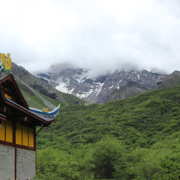The Dakini’s Ants
 In the outskirts of Sikkim, off-stage from most of the world, the Tibetan goddess wakes in her two-room temple. The radio clock on the bedstand digitizes 3:43am. She never uses its alarm. Morning is announced by the wolf. Not by a howl, or anything so grand, but humbly, by the rhythmic padding of his feet, as he does his daily ministrations, circling the temple in the silk darkness.
In the outskirts of Sikkim, off-stage from most of the world, the Tibetan goddess wakes in her two-room temple. The radio clock on the bedstand digitizes 3:43am. She never uses its alarm. Morning is announced by the wolf. Not by a howl, or anything so grand, but humbly, by the rhythmic padding of his feet, as he does his daily ministrations, circling the temple in the silk darkness.
The dakini rubs her eighty-year-old eyes and rises, pushing against the warmth of her bed. The room smells of the toasted barley meal she had for dinner the night prior, but she can hardly see from her bed to the kitchen nook, where the pot likely still stands. Her nephew says she needs cataract surgery.
Oxygen is brought into her arms, her vertebrae, the backs of her legs, as Khandro-la touches her toes with satisfaction. Her back protests, as she comes back to standing, and yet her body slides into the groove of her day as easily as it accepts the warmth of her woolen chuba.
After performing her prostrations and prayers, she steps outside. The air has turned a purple brown, bruised from yesterday’s heat and yet, abandoned overnight by its aggressor, it has become chilled and ambivalent. It carries the wolf’s musk, the flossflowers’ sweat, and now the dakini’s own permanent incense, a scent that, like the symbols created by her veins, reveal her as a goddess.
The temple is not much bigger than a large barn. But there the resemblance stops. Thick walls and an arched roof protect a bedroom suite and a prayer room brimming with books. The hilltop grounds are surrounded by trees, save a view of the still-dark village below.
Stepping out of her doorway, Khandro-la ducks as a bat swoops a silent good-morning arc. The furry winged mouse settles on a roof tile to watch.
The goddess turns to the right, her hands mumbling over her prayer beads, adding her harmony to the pulsing hum of the locusts and the wolf’s padding feet. She follows the exterior of the temple, on the circular path her own feet have been creating, since she was fourteen years old, when she was orphaned, when she fled the Chinese, when she was discovered to be a dakini, a khandro, a female goddess whose very presence enhances a Buddhist’s access to a more spacious reality.
The beast and the goddess walk in lockstep, on opposite sides of the temple, invisible from, and yet fully aware, of each other.
At the temple’s first corner, the ant colony is bigger than it was just yesterday. One ant scurries at haphazard angles along the stucco. Khandro-la wishes it good morning and chuckles at the industriousness. Again, she turns right, into light made lavender by a fading moon.
From the direction of the village, a shadow rises up the hill. It’s the young woman with her baby. The mother joins Khandro-la’s circumambulation several paces behind her. The baby, slung under the woman’s breast, nurses at will, while the mother entrains with the goddess’s rhythm. Heel and then toe, breathe in and then out.
The young woman thinks of her grocery list, the morning meal, her sleeping husband – the way he looks at the infant with such alarm and adoration. She considers the splendor of moths and remembers the curve of her friend’s cherubic cheeks as she snorted iced tea in laughter. She winces at the memory of her father’s gnarled hands as he punctuated outdated advice. She notices the musk and how the ant colony has grown since yesterday.
A cat sashays from the woods, head high, fur painted pink by the rising sun. Too domesticated, or too haughty, to smell the wolf, she’s pretending she herself is a wild creature. She circles the temple, sniffing the walls for mice, side-eyeing the first birds to punctuate the drumming footsteps and locust hum. Her whiskers grimace at the ants.
A teenager, with hair cut in a sharp angle over one eye and piercings up the opposite ear, trudges up the hill, knuckles dragging. He’s been up all night. He joins the path, when the women are on the opposite side, and yet his legs find their rhythm. Distracted by his own needs, he, too, is unaware of the wolf.
But the beast is annoyed by the jangle and flash of the chains along the teen’s belt loops, the glint of the lip ring. He snarls silently and crouches, filling his lungs and readying his limbs. He has just shifted his weight to pounce, when the cat meows at the teenager.
The boy flinches and puts a finger to his lips. The wolf, startled, slinks off into the woods, shaking his head and sucking his teeth, his crescendo spoiled.
Naïve, the teen fills the wolf’s spot. He doesn’t know why he comes here. Nor does he know why he stays out so late. Neither feels right. Nothing feels right. How do those damn ants know what to build?
A man and a cane hobble uphill, their frowns lit a silver-gold. It’s been sixty-seven years, and the man still misses Tibet. He wants to die in that expansive plateau with air so dry every memory is preserved. He hates Darjeeling-esque tea, despite the fields wafting nearby, and English Breakfast tea, those attracted by their own colonization drink, and don’t get him started on that saccharine Indian chai. Each morning his wife prepares a thermos of proper tea, butter tea, which he savors all day. He must thank her, he thinks, as his feet brush dirt into the air, creating a cloud over the ants’ everchanging, ever-claiming abode. He halts and rushes home.
The light ticks orange, toward the obscurity of brightness. The mother, knowing better than to say goodbye, walks downhill, cooing in time to her steps. Khandro-la removes her chuba, and follows the woman with her gaze, as the cat threads her legs.
The teenager, having missed the cues – the dampened rhythm, the curtain that closed with the rising sun – blunders into the dakini’s line of sight. He blushes, stammers, apologizes, and then remembering she doesn’t like the spoken word, apologizes for apologizing and when she puts a hand up, he starts to cry.
Khandro-la sighs. She shakes a foot at the cat.
The young monk who cares for her – because the village and her nephew insist – peeks his head out the door. He says her breakfast is ready, and then notices the boy. His face pales.
Khandro-la rolls her eyes. And gestures the teenager indoors.
“No, no,” he stutters, waving his hands. Her reputation for refusing audiences, even to royalty, is legendary. “I’m leaving.”
She stamps a foot, and points indoors. Wiping tears from his face, he bows deeply and walks hunched into the small temple, toeing his shoes off in the doorway. He is ashamed of his socks. The holes, yes, but the smell is worse.
The dakini motions him to a pillow on the floor. The chains on his black jeans clang as he sits. She takes the cushion opposite, piling her chuba in her lap. The monk settles two cups of tea on the low table, before busying himself nearby. The walls are hung with silk so vibrant they seem to vibrate.
“I’m sorry; it’s just… I don’t know what to do,” the teen splutters.
“Have some tea,” she says. He has never heard her speak before and he has lived here his whole life.
“I mean, I don’t know what to do with my life.”
She takes a sip and waits.
“I don’t even know what I want,” he aches into the silence. “Some days, I love everyone and everything so much, I want to die. Other times, I hate everything and everyone so much, I want… I want to destroy them.” His voice cracks, and his lip blubbers. He’s admitted too much; he’s evil; he’s an idiot; the whole village will know. His chest clenches, pumping water to his eyes.
She waits.
He scans the room, his tears blurring the offerings of fruit and flowers into watercolor rainbows. He can smell her breakfast cooling on the stove. The monk stirs a pot.
She waits.
He looks down at his tea, water tinted green. A leaf settles to the bottom. He takes a shuddering breath and a sip.
She nods with gratitude and asks, “What do you do today?”
“I have school, but I have to go get my sister and change my shirt and…” he trails off in sullen frustration. The old woman hasn’t understood. She is smirking at her tea! Did she even hear him? Adults are so much less than they are supposed to be.
He wants to throw the teacup, and wonders if his sister has eaten breakfast, and if he’ll fall asleep during math, and how that new song in his head should open, and how do those ants know what to build next.
And then a smile spreads across his face, as his mouth traces her words: Do. Today.
He locks eyes with her.
The dakini giggles.


